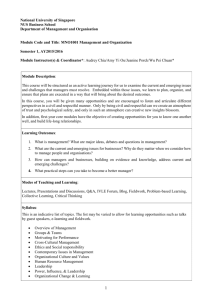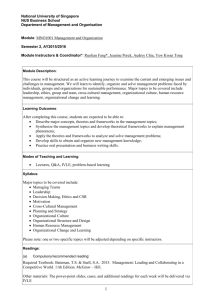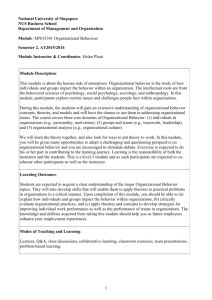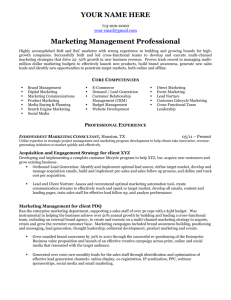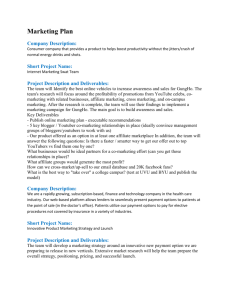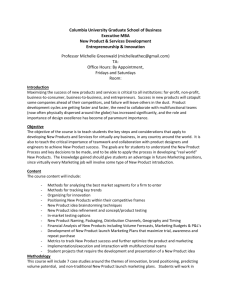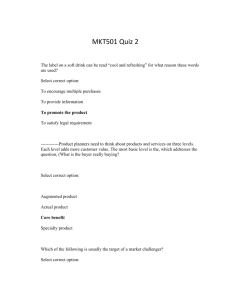NATIONAL UNIVERSITY OF SINGAPORE NUS
advertisement
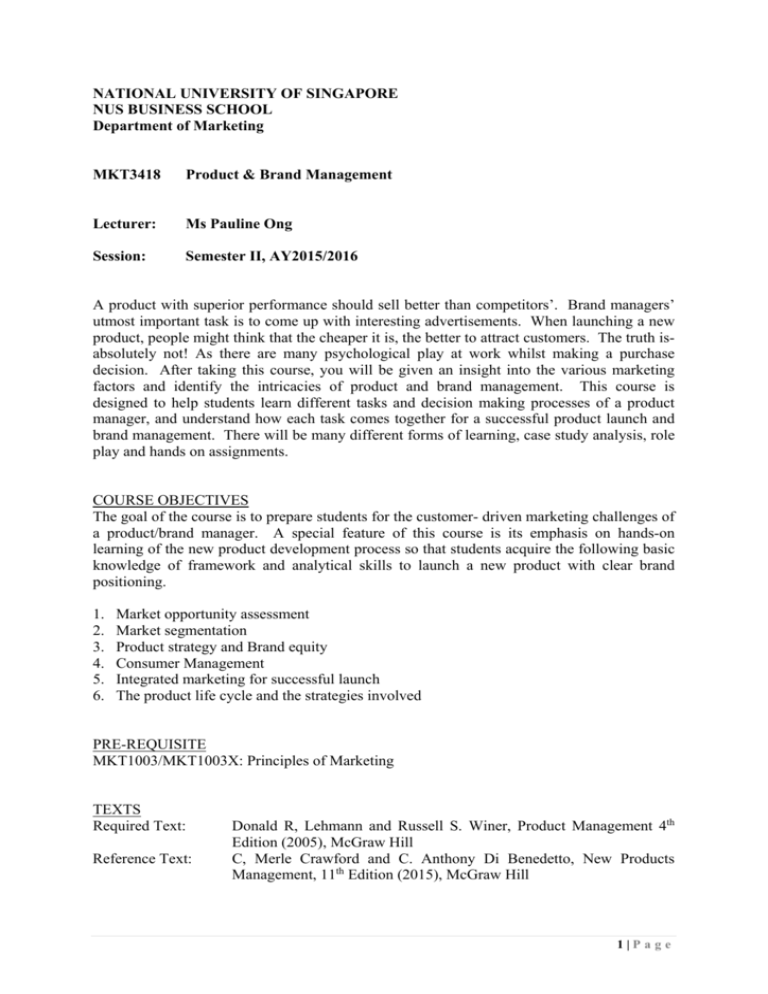
NATIONAL UNIVERSITY OF SINGAPORE NUS BUSINESS SCHOOL Department of Marketing MKT3418 Product & Brand Management Lecturer: Ms Pauline Ong Session: Semester II, AY2015/2016 A product with superior performance should sell better than competitors’. Brand managers’ utmost important task is to come up with interesting advertisements. When launching a new product, people might think that the cheaper it is, the better to attract customers. The truth isabsolutely not! As there are many psychological play at work whilst making a purchase decision. After taking this course, you will be given an insight into the various marketing factors and identify the intricacies of product and brand management. This course is designed to help students learn different tasks and decision making processes of a product manager, and understand how each task comes together for a successful product launch and brand management. There will be many different forms of learning, case study analysis, role play and hands on assignments. COURSE OBJECTIVES The goal of the course is to prepare students for the customer- driven marketing challenges of a product/brand manager. A special feature of this course is its emphasis on hands-on learning of the new product development process so that students acquire the following basic knowledge of framework and analytical skills to launch a new product with clear brand positioning. 1. 2. 3. 4. 5. 6. Market opportunity assessment Market segmentation Product strategy and Brand equity Consumer Management Integrated marketing for successful launch The product life cycle and the strategies involved PRE-REQUISITE MKT1003/MKT1003X: Principles of Marketing TEXTS Required Text: Reference Text: Donald R, Lehmann and Russell S. Winer, Product Management 4th Edition (2005), McGraw Hill C, Merle Crawford and C. Anthony Di Benedetto, New Products Management, 11th Edition (2015), McGraw Hill 1|Page Janelle Rose, Managing Consumer Markets, 1st Edition (2013), Pearson ASSESSMENT METHODS a) Class Participation b) Product Marketing Proposal (Group assignment) c) Product Marketing Plan (Group assignment) d) Final Test TOTAL 20% 20% 30% 30% 100% a) Class Participation (20%) Grading of class participation is not based on the amount of engagement but on the quality of questions and comments on the subject discussed. Effective answers to questions, and active involvement in in-class group discussions. Professional courtesy and respect to class are also strictly assessed. b) Product Marketing Proposal (20%) A field trip will be conducted to a selected company. Students will need to work in groups to discuss how they could launch the various products in the company. The findings will be put up as a proposal to the management of the company. c) Product Marketing Plan (30%) This is a continuation of the marketing proposal. Students working in the same group must identify, analyse and critically evaluate relevant internal and external market information from a strategic orientation to focus on the development of a product marketing strategy; develop an integrated product marketing strategy based on logical arguments and well-reasoned justification; devise integrated implementation, evaluation and control procedures for a marketing plan; work creatively to devise a product marketing plan that delivers a competitive advantage; and demonstrate effective communication skills and the ability to work with others in a professional manner. d) Final Test (30%) A final written close book test will be held in the last session. 2|Page Academic Honesty & Plagiarism Academic integrity and honesty is essential for the pursuit and acquisition of knowledge. The University and School expect every student to uphold academic integrity & honesty at all times. Academic dishonesty is any misrepresentation with the intent to deceive, or failure to acknowledge the source, or falsification of information, or inaccuracy of statements, or cheating at examinations/tests, or inappropriate use of resources. Plagiarism is ‘the practice of taking someone else's work or ideas and passing them off as one's own' (The New Oxford Dictionary of English). The University and School will not condone plagiarism. Students should adopt this rule - You have the obligation to make clear to the assessor which is your own work, and which is the work of others. Otherwise, your assessor is entitled to assume that everything being presented for assessment is being presented as entirely your own work. This is a minimum standard. In case of any doubts, you should consult your instructor. Additional guidance is available at: http://www.nus.edu.sg/registrar/adminpolicy/acceptance.html#NUSCodeofStudentConduct Online Module on Plagiarism: http://emodule.nus.edu.sg/ac/ 3|Page Summary of Class Schedule Week 1 12/1 Readings PM: Chapters 1-2 2 19/1 MCM: Chapters 4 3 25/1 4 2/2 Topic a) Course Overview b) Principles of Product & Brand Management Analysing and evaluating the marketing environment Case Study: Method for Success Field Trip PM: Chapter 8 MCM: Chapter 6 Product Strategy & Brand Equity Consumer and Organisational Behaviour Assignments Product marketing proposal & plan Product marketing proposal & plan Product marketing proposal & plan Case Study: Caught Red Handed (Nestle) 5 9/2 6 16/2 (Lunar New Year- Class cancelled) PM: Chapter 9 NPM: Chapter 4 Product Development Concept Generation Submission of Product marketing Proposal Mid-Term Quiz Product marketing plan Recess Week (20/2 -28/2) 7 PM: Chapter 9 1/3 NPM: Chapters 8-9 Product Development - Evaluation Product marketing plan 8 8/3 Case Study: Porsche: Guarding the Old and Bringing the New New Product Launch & Marketing Mix (I) Product marketing plan PM: Chapter 10 9 15/3 PM: Chapters 1113 10 22/3 11 28/3 12 5/4 13 12/4 PM: Chapter 8 Activity – Creative Ideas New Product Launch & Marketing Mix (II) Activity: It’s Shopping Time! Product Lifecycle Strategies Group Presentations I Product marketing plan Product marketing plan Submission of Product Marketing Project Group Presentations II Final Test & Project Review 4|Page


